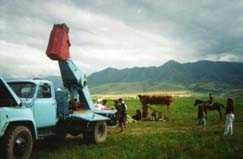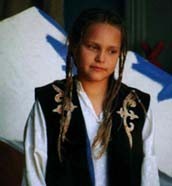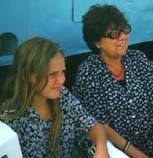 |
Vol 1, No 19
1 November 1999 |
|
|
Her Story, A History Marta Meszaros interviewed on Kisvilma - Az utolso naplo Andrew Princz "A person cannot be freed of their roots," said Marta Meszaros during the final days of shooting of her forthcoming feature film Kisvilma - Az utolso naplo (Little Vilma - The Last Diary), largely set in Kyrgyzstan, on the very site where the film-maker spent her early childhood. It was here that Meszaros was orphaned when her parents fell victim of the Stalinist purges of the 1930s. Like the earlier parts of her "diary" series, this is an autobiographical film, this time revealing the story, largely unknown in the West, of a whole generation of survivors of the Soviet Gulag. A German, Hungarian, Polish and Kyrgyz co-production, this film will be the last of the internationally acclaimed series, which has so-far included Naplo gyermekeimnek (Diary for My Children, 1982), Naplo szerelmeimnek (Diary for my Loves, 1987) and Naplo apamnak, anyamnak (Diary for my Father and Mother, 1990). [For more information on the Diary films and Meszaros's relationship with autobiography see Kinoeye's review of A szerencse lanyai (Daughters of Luck, 1998)] A day of filming in Bishkek, the capital of Kyrgyzstan, was more reminiscent of a family gathering than a film-shoot. Nyika Jancso, the son of the director, sitting at the camera, perched on a boom dating from the Soviet era. The director's father is played by her actor husband’s son, Lukacs Nowicki; while the main character of little Vilma, or rather Meszaros in her youth, is played by Meszaros's own twelve-year-old granddaughter Cleo Ladanyi. On one hot august afternoon, after a long day of filming, Andrew Princz spoke with the director in Bishkek. What memories do you wish to conjure up in this film?
Foreigners, many of whom were leftist in orientation, were also the victims of the Stalinist regime. Europe was a very difficult place to live in the 1930s. There was the rise of fascism, then Hitler's victory in Germany. In the Soviet Union, these things were unknown. In America during the 1960s some young people started to rebel and then joined the left. They went to the Soviet Union, and many were then destroyed by the system. When I started to film the trilogy, I felt that these people cannot be forgotten. However, some ten years ago, I could not have even have dreamed of making this film in the Soviet Union, in Russia or in Kyrgyzstan. How do you evaluate these memories today? I have mixed feelings about them. On the one hand, it is about a terrible tragedy. To lose your parents and be left alone in the end of the world in a Central Asian country. But a child is still a child, and I have plenty of good memories too. Had there not been many good and even interesting people around these children, many would never have survived. Really, though, this is still a film. It is about me, and about us… yet in the end, it has to fall short of both. In a film, one writes a story, and it has to be the story of many people. What is the synopsis of the film? A woman who is my age goes to Kyrgyzstan and obtains the papers relating to the death of her father. The documents reveal that her father was executed. She has just learnt this now, and this, in fact, is really what has happened to me. I only learned the truth of my father's execution in 1999. What did you know about his fate earlier? That he had died. He was arrested, deported, but of his execution and when it happened… they never talked about that. The system never revealed the real documents. When Askar Akayev became the president of Kyrgyzstan (I don't know what he is like as a President, but in this way he is a decent man) he considered it his duty to release the original documents. So, this is the gist of the film, a woman comes here and confronts herself and her childhood. When did you first return to Kyrgyzstan? In 1990. But as I said, at that time it would have been impossible to make a film like this. This is the country where your parents were killed. You spent many difficult years in this country. What brought you back? Look, a person cannot be freed of their roots… I really wanted to shoot this film. It was important for me to oblige the Kyrgyz State to admit that my father was innocently killed. This did happen. My father was morally and materially rehabilitated. This is the reason that they allowed me to do this film.
I have already made films with my son Nyika, the cameraman. It was only natural that I wanted to work on this with him. My other son, Zoltan, the father of Cleo, is also part of the crew. I thought that my granddaughter Cleo would be able to play my childhood-self. Luckily, she is even better than I imagined she would be in this role. She is very talented. She was a bit scared at first, but then she got very good at it. Cleo knows that she plays me as a child, but in the end; it is not absolutely necessary that it should be me. Why do you think that so little attention has previously been paid to the issues you address in your film? I think that it is less in the common consciousness that in the thirties Europeans came here and worked here. They had no plans to remain here forever, and in the end, they were killed. Recently, there has been literature written on this subject, and they are starting to publish more documents. The West, however, is slow to talk about it. The European left, particularly the French and the Italian Communists and Socialists, are not keen to talk about it because in some way they were implicated in this story. When those who survived returned to France, Germany or Italy - they did not reveal the truth. They did not want to say that, yes, our friends were killed but we survived. Why and how did we survive? It was a delicate question. At any rate, they wanted to maintain their faith and their idealism. Yes, maybe Stalin was a dictator, they thought, but still, the idea of Socialism remains both good and decent. They defended this view for a long time to come. In Hungary, society has given great opportunities to and invested in their youth. This does not seem to be the case in this country? People are still afraid here. This is the problem of the past seventy years: the system was based upon intimidation. People were afraid to talk with each other, were afraid of history, they were scared to tell the truth. It is difficult to be freed of this attitude. Still today I notice that whenever they talk, people look left and right for fear of being reported to the authorities. In Hungary and in Poland - I live in two countries - the situation is somewhat different. In Poland, it seems better than in Hungary. In Hungary the thirty years of the Kadar regime left deep scars. Maybe economically it was more favourable, we lived better, but the period was nevertheless disabling spiritually. I think that continuous rebellion in Poland carried more energy and truth within itself. In Central Asia it is also difficult to affect change because people do not know what it means to work. During Socialism, they earned little, they did not have to have a career outside of the Communist party. At that time, there was only ideology. Yet this is a beautiful and interesting country. They are strange these people, the Kyrgyz, there is something wild about them. The subtitle of this film is "The Last Diary". Why? Well, I hope that I will still make films, but this particular story ends here. Nevertheless, I would be glad to come back here. I would love to make a road-movie in Kyrgyzstan. I think that with a simple story, travelling through this landscape… it could end up being a fascinating film. Unfortunately it is hard to raise money for films in Europe. European film-making is not in very good shape. There is little money available, and generally the American film industry has swallowed European cinema. This article was originally published in Nepszabadsag and Central Asian News. A full version of the interview in English can be found at Andrew Princz's website
|
|
![]()
Copyright (c) 1999 - Central Europe Review and Internet servis, a.s.
All Rights
Reserved



 Refugees and Migration
Refugees and Migration